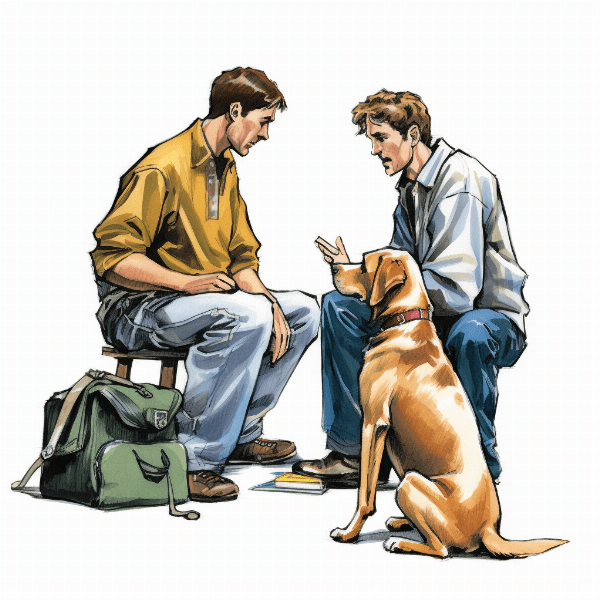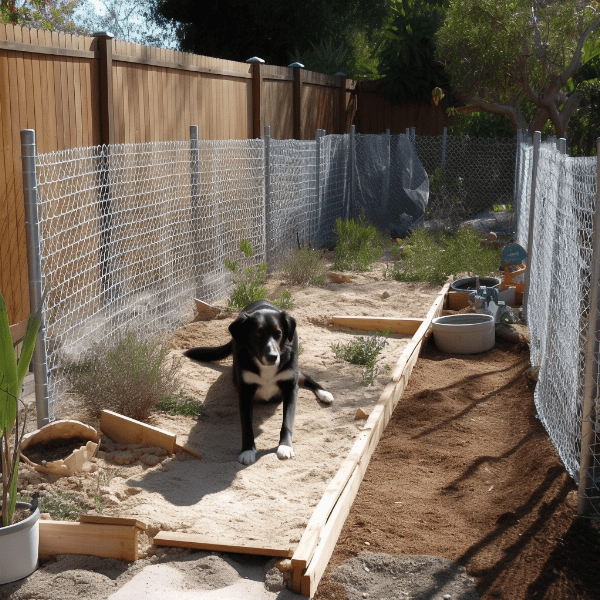Table of Contents
- Understanding the Reasons Behind Dog Digging
- Importance of Addressing Digging Behavior in Dogs
- Natural Home Remedies to Stop Dog Digging
- Using Essential Oils to Deter Dogs from Digging
- Creating a Digging Pit for Your Dog
- Training Techniques to Stop Dog Digging
- Making Changes to Your Dog’s Environment to Stop Digging
- Using Positive Reinforcement to Encourage Good Behavior
- Understanding the Limits of Home Remedies
- Seeking Professional Help for Persistent Digging Behavior.
Understanding the Reasons Behind Dog Digging
Dogs are known to be natural diggers, and it is a common behavior seen among several dog breeds. However, excessive digging can cause significant damage to your garden or backyard, and it’s essential to understand the reasons behind this behavior to address it effectively.
Instinctive Behaviors
Dogs have a natural instinct to dig, and it’s often seen as a way of exploring and marking their territory. They may also dig to create a comfortable spot to rest, especially during hot weather. Understanding your dog’s instincts can help you determine the root cause of their digging behavior.
Boredom and Anxiety
Dogs that are bored or anxious may start digging as a way of releasing their pent-up energy. This behavior can also be a sign of separation anxiety, where the dog becomes anxious and distressed when left alone. In such cases, they may dig out of fear or frustration.
Seeking Attention
Dogs that are not getting enough attention or mental stimulation may start digging as a way of seeking attention from their owners. They may also do it to get their owner’s attention, especially if they have been left alone for an extended period.
Trying to Escape
Dogs may also dig as a way of trying to escape. This behavior is more common in dogs that are kept in a yard or garden for extended periods. In such cases, they may dig under the fence or gate to get out and explore the surrounding area.
Understanding the reasons behind your dog’s digging behavior is the first step towards addressing it effectively. By identifying the underlying cause, you can develop an appropriate strategy to prevent excessive digging while still allowing your dog to enjoy the outdoors.
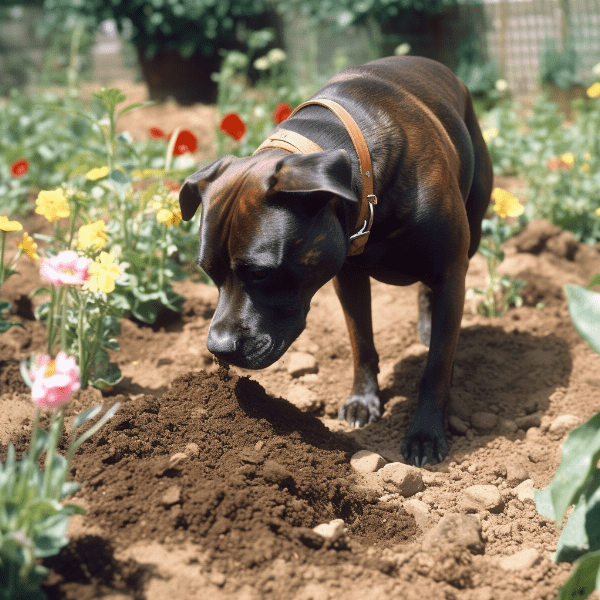
Importance of Addressing Digging Behavior in Dogs
While digging is a natural behavior for dogs, it can become problematic if left unaddressed. There are several reasons why it’s important to address excessive digging behavior in your dog.
Preventing Damage to Property
Dogs that dig excessively can cause significant damage to your property, including your garden, lawn, and backyard. They may also dig under fences or gates, creating escape routes that can be dangerous for your pet.
Ensuring Your Dog’s Safety
Excessive digging can also be a safety concern for your dog. They may ingest harmful materials or substances while digging, leading to health problems. They may also injure themselves while digging or escape from your property and become lost or injured.
Reducing Neighbor Complaints
Digging behavior can be disruptive to your neighbors, especially if your dog is digging in a shared space or close to a property boundary. Addressing the behavior can help prevent complaints and maintain positive relationships with your neighbors.
Improving Your Relationship with Your Dog
By addressing your dog’s digging behavior, you can improve your relationship with them. This can be achieved by providing more mental stimulation, spending more time with them, and developing positive reinforcement techniques that encourage good behavior.
In conclusion, addressing excessive digging behavior in dogs is essential for preventing damage to property, ensuring your dog’s safety, reducing neighbor complaints, and improving your relationship with your pet. By understanding the reasons behind your dog’s digging behavior and taking appropriate action, you can prevent excessive digging and ensure a happy and healthy life for your furry friend.
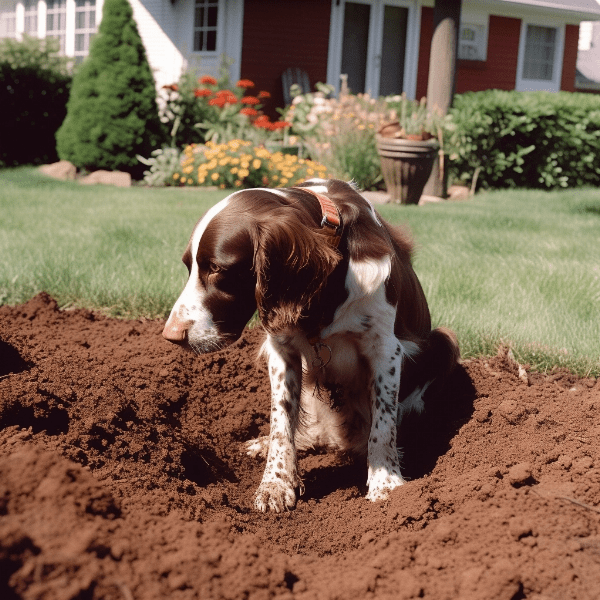
Natural Home Remedies to Stop Dog Digging
If your dog’s digging behavior is causing problems in your home or yard, there are several natural home remedies that you can try to discourage this behavior. Here are some effective remedies to stop Dog digging:
Citrus and Vinegar Sprays
Dogs dislike the smell of citrus and vinegar, making them an effective natural deterrent for digging. You can create a spray by mixing equal parts of water and either citrus or vinegar and spray it on areas where your dog likes to dig. Repeat this process every few days until your dog loses interest in digging in those areas.
Spices and Herbs
Several spices and herbs, such as cayenne pepper, black pepper, and garlic, can be used to discourage dogs from digging. You can sprinkle these spices around the areas where your dog likes to dig or mix them with water to create a spray.
Bitter Apple Spray
Bitter apple spray is a natural product that can be used to discourage your dog from digging. The spray has a bitter taste that dogs dislike, and you can apply it to areas where your dog likes to dig.
Provide Adequate Exercise and Stimulation
One of the most effective natural remedies for dog digging is providing your dog with enough exercise and mental stimulation. Regular walks, playtime, and training sessions can help reduce boredom and anxiety, which are common reasons for excessive digging.
In conclusion, natural home remedies can be effective in stopping your dog’s digging behavior. By using citrus and vinegar sprays, spices and herbs, bitter apple spray, lavender oil, and providing adequate exercise and stimulation, you can discourage your dog from digging while keeping them healthy and happy.
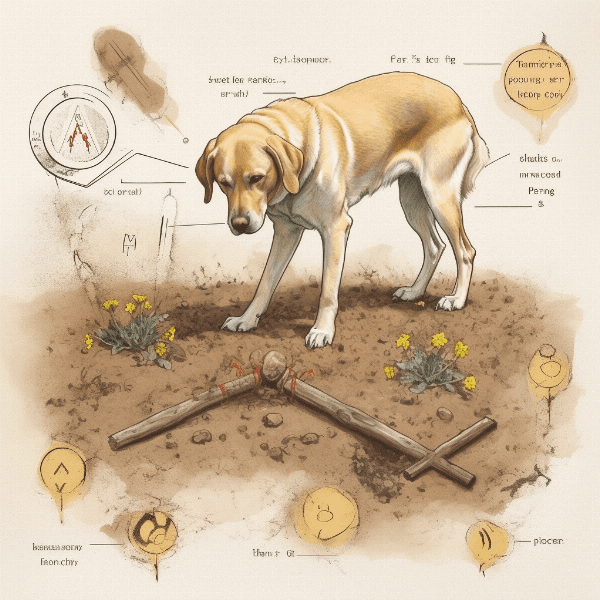
Using Essential Oils to Deter Dogs from Digging
Essential oils are becoming an increasingly popular natural remedy for dogs. They can be used for a variety of purposes, including deterring dogs from digging. Here are some essential oils that can be effective in stopping your dog’s digging behavior:
Lemon Oil
Lemon oil is a natural repellent for dogs and can be used to deter them from digging. The scent of lemon is strong and unpleasant for dogs, making it an effective way to keep them away from areas where they like to dig.
Lavender Oil
Lavender oil is a natural calming agent for dogs and can help reduce anxiety and boredom, which are common reasons for excessive digging. The scent of lavender can also help keep dogs away from areas where they like to dig.
When using essential oils to deter your dog from digging, it’s important to dilute them properly and use them in moderation. You can mix a few drops of essential oil with water and spray it on areas where your dog likes to dig, or use a diffuser to spread the scent throughout your home.
In conclusion, essential oils can be an effective natural remedy to stop your dog from digging. By using peppermint oil, eucalyptus oil, lemon oil, and lavender oil, you can deter your dog from digging while keeping them calm and healthy.

Creating a Digging Pit for Your Dog
If your dog loves to dig, creating a designated digging pit can be an effective solution to redirect their digging behavior. Here are some steps to create a digging pit for your dog:
Choose the Right Location
Choose a location in your yard that is easily accessible for your dog and away from any areas where they are not allowed to dig. It’s also important to choose a location that is well-drained to prevent waterlogging.
Prepare the Area
Mark the area where you want to create the digging pit and remove any grass or plants. You can also add sand or gravel to the area to create a more attractive digging surface for your dog.
Add Toys and Treats
To encourage your dog to use the digging pit, add some toys and treats to the area. This will make the pit more enticing for your dog and help them associate the pit with positive experiences.
Train Your Dog
It’s important to train your dog to use the digging pit and not dig in other areas of your yard. When your dog starts digging in the pit, praise and reward them with treats or toys. If they start digging in other areas, redirect them to the digging pit and encourage them to dig there instead.
Maintain the Digging Pit
Regularly maintain the digging pit by removing any waste or debris and adding fresh sand or gravel. You can also add new toys and treats to keep your dog interested in the pit.
Creating a digging pit for your dog can be an effective way to redirect their digging behavior and provide them with a fun and safe area to dig. By choosing the right location, preparing the area, adding toys and treats, training your dog, and maintaining the pit, you can create a designated area for your dog to dig while keeping your yard and property safe.

Training Techniques to Stop Dog Digging
Redirecting Behavior
Redirecting your dog’s digging behavior to a designated digging pit can be an effective way to prevent them from digging in other areas of your yard. When you catch your dog digging in an area where they are not supposed to, redirect them to the digging pit and encourage them to dig there instead.
Using Verbal Cues
Using verbal cues can be an effective way to stop your dog from digging. When you catch your dog digging in a prohibited area, use a firm voice to tell them to stop. You can also use a command such as “leave it” or “no digging” to reinforce the behavior you want to discourage.
Providing Adequate Exercise and Stimulation
Providing your dog with enough exercise and mental stimulation can help reduce boredom and anxiety, which are common reasons for excessive digging. Regular walks, playtime, and training sessions can help keep your dog active and engaged, reducing the likelihood of digging behavior.
Consistency
In conclusion, training your dog to stop digging behavior can be an effective solution to prevent damage to your property and keep your pet safe. By using positive reinforcement, redirecting behavior, using verbal cues, providing adequate exercise and stimulation, and being consistent, you can train your dog to stop digging and develop good behavior habits.

Making Changes to Your Dog’s Environment to Stop Digging
Making changes to your dog’s environment can be an effective way to stop their digging behavior. Here are some changes you can make:
Fence Off Prohibited Areas
If there are areas in your yard where you don’t want your dog to dig, you can fence them off. This will prevent your dog from accessing these areas and reduce the likelihood of digging behavior.
Use Digging Deterrents
Digging deterrents such as chicken wire or rocks can be used to discourage your dog from digging in certain areas. Covering the areas with chicken wire or placing rocks on top can make it difficult for your dog to dig, which can help discourage the behavior.
Bury Chicken Wire
Burying chicken wire a few inches below the surface in areas where your dog likes to dig can also be an effective deterrent. The wire is uncomfortable for your dog to dig through, which can discourage them from digging in that area.
Provide Shade and Water
Dogs may dig to create a comfortable spot to rest, especially during hot weather. Providing shade and water in your yard can help reduce the likelihood of digging behavior.
Supervision
Supervision is essential when it comes to preventing digging behavior in dogs. Keeping an eye on your dog while they are outside can help you identify when they are about to start digging and redirect their behavior.
In conclusion, making changes to your dog’s environment can be an effective way to stop digging behavior. By fence off prohibited areas, using digging deterrents, burying chicken wire, providing shade and water, and supervision, you can discourage your dog from digging and keep them safe and healthy.
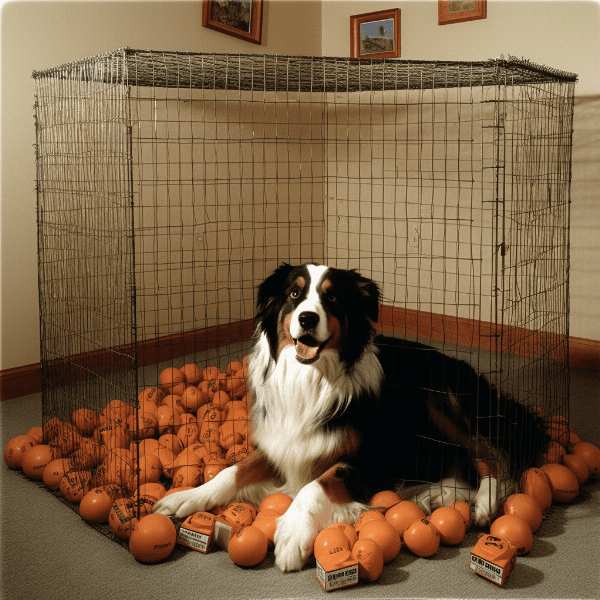
Using Positive Reinforcement to Encourage Good Behavior
Positive reinforcement is a powerful tool for training your dog to exhibit good behavior. Here are some ways you can use positive reinforcement to discourage digging behavior:
Rewarding Good Behavior
Rewarding your dog for good behavior is one of the most effective ways to encourage them to repeat that behavior. When your dog exhibits good behavior such as not digging in a prohibited area or using a designated digging pit, praise them and reward them with treats or toys. This will help your dog associate good behavior with positive experiences.
Verbal Praise
Verbal praise can be a powerful form of positive reinforcement for dogs. When your dog exhibits good behavior such as not digging in a prohibited area, use a positive tone to praise them. This will help them understand that they have done something good and encourage them to repeat that behavior.
Clicker Training
Clicker training is a form of positive reinforcement that involves using a clicker to mark good behavior. When your dog exhibits good behavior such as not digging in a prohibited area or using a designated digging pit, click the clicker and reward them with treats or toys. Over time, your dog will associate the sound of the clicker with positive experiences and be more likely to repeat that behavior.
Consistency
Consistency is essential when it comes to using positive reinforcement to encourage good behavior. It’s important to be consistent with your praise and rewards and to use them every time your dog exhibits good behavior. This will help your dog understand what is expected of them and reduce confusion.
In conclusion, positive reinforcement is a powerful tool for encouraging good behavior in dogs. By rewarding good behavior, using verbal praise, clicker training, and being consistent, you can train your dog to exhibit good behavior and reduce digging behavior. Remember to always use positive reinforcement and avoid punishment, which can be counterproductive and damage the relationship between you and your dog.
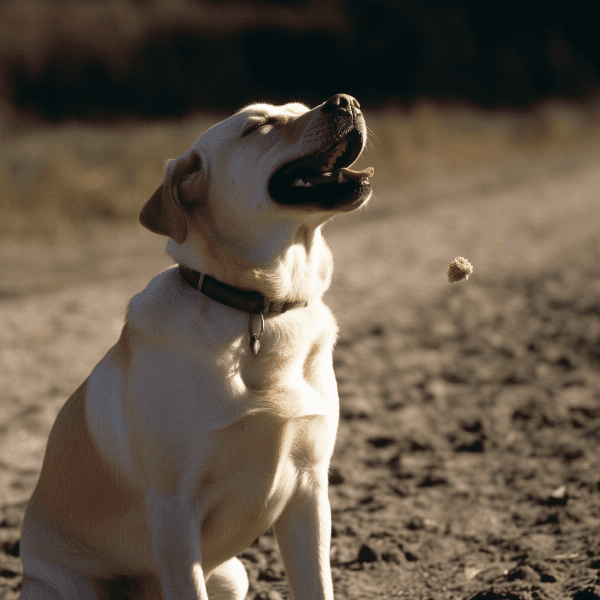
Understanding the Limits of Home Remedies
While home remedies can be effective in stopping your dog’s digging behavior, it’s important to understand their limits. Here are some things to keep in mind:
Some Dogs May Need Professional Help
Some dogs may have digging behavior that is caused by underlying medical or behavioral issues that cannot be resolved with home remedies. In these cases, it’s important to seek the help of a professional dog trainer or veterinarian who can provide tailored solutions for your dog.
Home Remedies May Not Work for All Dogs
Not all home remedies will work for all dogs. Some dogs may be indifferent to the smell of citrus or vinegar, for example, or may find digging pits unappealing. It may take some trial and error to find a home remedy that works for your specific dog.
Home Remedies are Not a Substitute for Training
While home remedies can be effective in deterring digging behavior, they are not a substitute for proper training. Training your dog to understand what behavior is expected of them and providing them with enough exercise and mental stimulation is essential to stopping digging behavior.
Consistency is Key
Consistency is essential when it comes to using home remedies to stop your dog’s digging behavior. It’s important to use the remedies consistently and to be patient, as it may take some time for your dog’s behavior to change.
In conclusion, home remedies can be effective in stopping your dog’s digging behavior, but it’s important to understand their limits. If your dog’s digging behavior persists or is caused by underlying medical or behavioral issues, it’s important to seek the help of a professional. Remember that home remedies are not a substitute for proper training and consistency is key. With patience and persistence, you can train your dog to exhibit good behavior and reduce digging behavior.
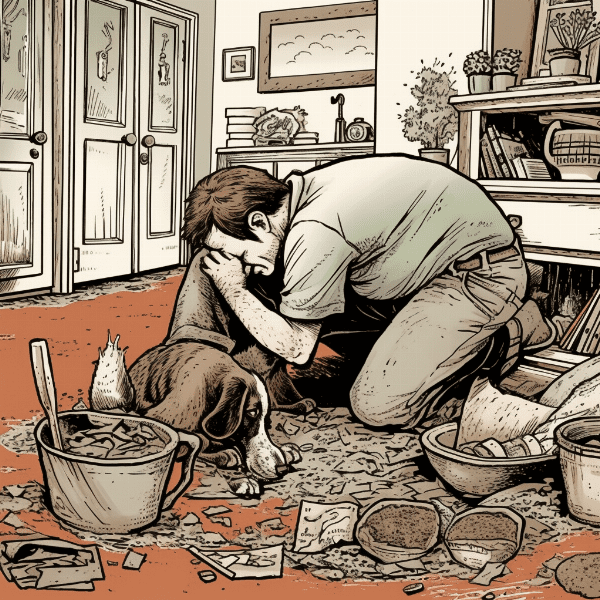
Seeking Professional Help for Persistent Digging Behavior.
If your dog’s digging behavior persists despite your efforts to address it with home remedies and training, it may be time to seek professional help. Here are some reasons why seeking professional help may be necessary:
Underlying Medical or Behavioral Issues
Persistent digging behavior may be caused by underlying medical or behavioral issues that require professional help to resolve. A veterinarian or animal behaviorist can help identify and address these issues.
Tailored Solutions
A professional dog trainer or behaviorist can provide tailored solutions for your dog’s specific digging behavior. They can assess your dog’s behavior and create a customized training plan to address the issue.
Support and Guidance
Seeking professional help can provide you with the support and guidance you need to effectively address your dog’s digging behavior. A professional can provide you with the knowledge and tools you need to train your dog and maintain good behavior.
Preventing Further Damage
Persistent digging behavior can cause damage to your property and pose a risk to your dog’s safety. Seeking professional help can help prevent further damage and ensure your dog’s safety.
In conclusion, seeking professional help may be necessary if your dog’s digging behavior persists despite your efforts to address it with home remedies and training. A professional can help identify and address underlying medical or behavioral issues, provide tailored solutions, offer support and guidance, and prevent further damage. Remember that persistent digging behavior is a problem that can be resolved with the help of a professional.
